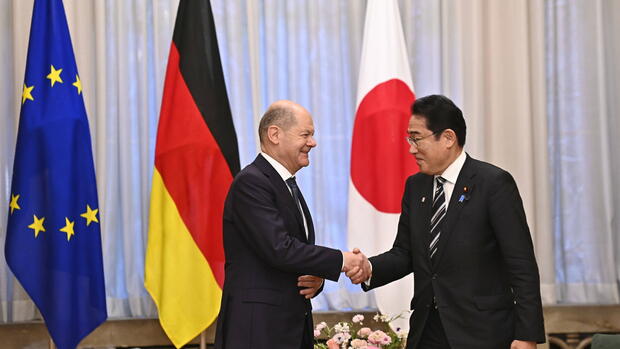While Germany has proclaimed a turning point, Japan has been delimiting itself from China for years.
(Photo: IMAGO/ZUMA Wire)
13 hours there, 13 hours back: During the federal government’s short trip to Tokyo two weeks ago, the coalition members had plenty of time to talk – and to venture a look beyond the everyday hiccups in Berlin.
After all, the destination Japan was not chosen by chance. The Japanese show how the turning point works.
The country adjusted its pacifist attitude and increased the defense budget for 2023 by 26 percent. At the same time, it is trying to free itself from China’s economic grip, at least in strategically important areas.
Japan’s Prime Minister Fumio Kishida has set up a ministry for “Economic Security” that systematically analyzes supply chains. Japan no longer wants to be open to blackmail when it comes to the supply of raw materials, microchips, medicines or food. A role model for Berlin and Brussels?
The parallels are striking. For a long time, Japan benefited greatly from China’s growth. The People’s Republic is the market and production location for Japanese companies, and at the same time it is a source of important resources and products. Japan shares these dependencies with Germany and Europe. The difference is that Japan has a strategic approach to overcoming them.
Japan wants to trim G7 for “economic security”.
In 2010, China cut off Japan’s supply of rare earth elements, which are essential for manufacturing high-tech goods, after a fisheries dispute. It was a wake-up call for the Japanese government, which has gradually reduced its vulnerability ever since. The G7 presidency, which Japan took over from Germany this year, wants to use Tokyo to swear the leading democratic economic nations to the concept of “economic security”.
>> Read also: Comeback of the command economy? Von der Leyen is realigning European economic policy
Chancellor Olaf Scholz seems to be particularly interested in Japan. He has already traveled there twice during his short term as chancellor. He speaks of wanting to strengthen Germany’s economic “resistance” and to “diversify” trade relations, which means nothing more than reducing dependency on China.
Only: the chancellor’s office doesn’t seem to feel any particular urgency. The readjustment should take place gradually in order to keep the economic consequences as low as possible.
Every week, Moritz Koch, head of the Handelsblatt office in Brussels, analyzes trends and conflicts, regulatory projects and strategic concepts from the inner workings of the EU, alternating with other Brussels correspondents. Because anyone interested in business needs to know what’s going on in Brussels. You can reach him at: [email protected]
Time game at the turning point – that’s how Scholz makes politics. The concept of economic security is also controversial in the Chancellery. Even after the dramatic experience of the Ukraine war and the Russian attempts to plunge Germany into a supply emergency with a gas embargo, the forces of inertia are great. The turning point reaches its limits where it collides with economic interests.
The decisive impetus is now coming from Brussels. EU Commission chief Ursula von der Leyen announced a “strategy for economic security” last week. It includes the stability of supply chains and trade routes, the protection of critical infrastructure and the control of future technologies by restricting exports and investments.
The EU Commission has now realized that the economy and security are not separate spheres. A lot would be gained if this knowledge matured in the federal cabinet during the many hours on the government plane.
More: Von der Leyen wants to restrict European investments in China
